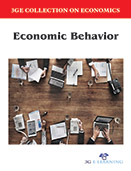Economics

Behavioral economics, along with the related sub-field behavioral finance, studies the effects of psychological, social, cognitive, and emotional factors on the economic decisions of individuals and institutions and the consequences for market prices, returns, and resource allocation, although not always that narrowly, but also more generally, of the impact of different kinds of behavior, in different environments of varying experimental values. Standard economic models portray decision makers as perfectly rational agents who act selfishly to maximize their total earnings. In contrast, ample evidence in behavioral research suggests that people systematically deviate from the extreme rational assumption of such economic models. The methods used in behavioral economics are the same as those in other areas of economics. At its inception, behavioral economics relied heavily on evidence generated by experiments. More recently, however, behavioral economists have moved beyond experimentation and embraced the full range of methods employed by economists. Experiments played a large role in the initial phase of behavioral economics because experimental control is exceptionally helpful for distinguishing behavioral explanations from standard ones. For example, players in highly anonymous one-shot take-it or-leave-it “ultimatum” bargaining experiments frequently reject substantial monetary offers, ending the game with nothing
This book entitled “Economic Behavior” is aimed at identifying the forces which shape the economic decisions that people make, in order to provide important insights of the human nature. This book deals with questions such as how the presentation of information effect decision making, how different types and valances effect behavior, and what are the social, emotional, and situational factors that underlie economic decision making. The book describes foundational topics in behavioral decision making and economics that lead to the emergence of behavioral economics; debasing techniques, neuroeconomics; and discusses key issues, focusing on a more comprehensive approach. This book will be of great interest to academics and all persons involved in the understanding and reshaping of organization arrangements in the field of business administration.